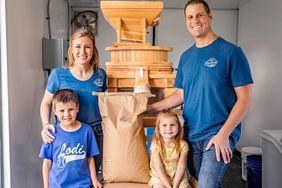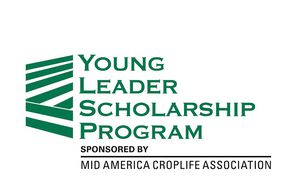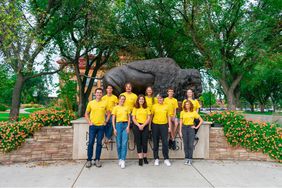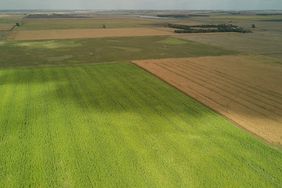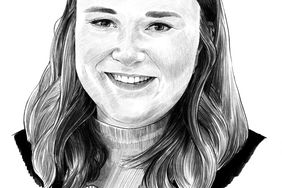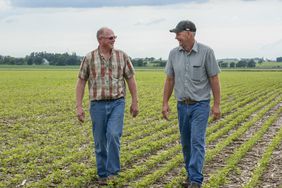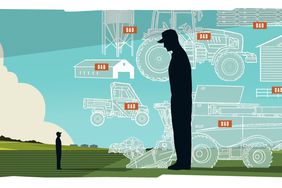:max_bytes(150000):strip_icc()/NolanBerg11-614304448-1-2000-3eacb1979fa0487bbb61480eca77bb43.jpg)
By Bonnie Johnson, AgCareers.com
Farming and related industries employ nearly 22 million people, which is almost 11% of U.S. employment. Direct on-farm employment accounts for 2.6 million of those jobs, according to USDA. So, for about every 10 people employed in the agricultural industry, one is on-farm and nine are behind the scenes in supporting careers.
One of those people behind the scenes who illustrates the extraordinary impacts of agriscience was Norman Borlaug, a revolutionary agricultural scientist who won the Nobel Peace Prize in 1970. Borlaug studied forestry, plant pathology, and genetics. His agricultural research led to developing a disease-resistant wheat variety that produced higher yields for developing nations. Because of this, he is credited personally with saving more than a billion people worldwide from starvation.
The next generation needs more scientists like Borlaug. Agriscience careers are crucial to ensuring food security worldwide.
Education
While the definition of agriscience is simple — the application of science to agriculture — the field is quite complex. The application of scientific methods and principles to agricultural practices requires educated, trained, and skilled professionals committed to the industry.
Students typically recognize science interests in high school, where courses in chemistry, physics, biology, and computer science are beneficial. Some scientific job opportunities are available to those with an associate’s degree, but agriscience careers commonly require a bachelor’s degree from a four-year college or university. Agricultural scientists may also benefit from an advanced degree, such as a master’s or doctorate.
Many higher education institutions in the United States have colleges of agriculture, which provide a comprehensive look at the entire industry, along with the necessary related scientific principles. Students will frequently find life sciences such as zoology, horticulture, food science, and micro-biology incorporated into the college of agriculture. Students may also add a minor in fields like animal science, toxicology, or environmental science, to name just a few examples.
Some education programs also offer certifications where students can earn an official recognition of their emphasis area, providing further experience and specialization for job search and on-the-job success. Certification or badge program examples include soil science, cattle production, sustainability, precision agriculture, or data science.
Program names and offerings will vary by institution. AgCareers.com uses data from the site’s job postings, surveys, and industry insights to identify emerging careers projected to be in high demand with an excellent future job market outlook.
Positions related to agricultural technology, sustainability, the environment, digital, and information technology expect substantial growth opportunities. The Bureau of Labor Statistics expects STEM (science, technology, engineering, and mathematics) occupations to increase 11% by 2032, whereas non-STEM occupations will increase only 2%.
Networking
Beyond education, organizational involvement can be a strategic career development initiative for students. Employers prefer to hire students with solid training who also demonstrate involvement in on and off-campus clubs and organizations.
Strategies for networking involve joining collegiate organizations in agriscience, such as Minorities in Agriculture, Natural Resources, and Related Sciences (MANRRS); Agriculture Future of America (AFA); or FFA at the collegiate level. Related professional organizations specific to an industry sector and career offer numerous additional opportunities; discover more organizations for each career path at agcareers.com/career-profiles.
This article originally appeared in the SF College Edition magazine.
High-demand agriscience careers
Food scientist
Food scientists investigate foods and their processing. This research might involve studying food’s molecular makeup, improving food sustainability, or enhancing its nutritional content.
Food scientists do this by creating research hypotheses, carrying out experiments, analyzing data, and writing reports based on conclusions they have discovered. A bachelor’s degree
in microbiology, biology, chemistry, food science, or a related field is required to become a food scientist. Some positions, especially those that are more research-driven, may require a master’s or doctorate degree.
Agricultural engineer
Agricultural engineers study and apply engineering science and design principles for using and developing agricultural land, buildings, machines, and equipment across diverse agricultural projects. They design, build, and test equipment and processes that reduce operation costs, eliminate emissions, enhance operator safety, and improve sustainable agriculture practices.
A bachelor’s degree in agricultural, civil, environmental, or chemical engineering is required. An agricultural background, especially in production, may be helpful but isn’t essential.
Animal welfare specialist/auditor
A professional working as an animal welfare specialist or auditor typically performs inspections of animal handling and welfare along with food safety audits on farms, animal production facilities, and animal processing facilities. The primary responsibilities of an animal welfare specialist
are to conduct these inspections and audits to assure appropriate measures are being taken and all state mandates are being practiced. A bachelor’s degree in animal science, animal welfare, or a related field is required. It is also often preferred that an animal welfare auditor be certified by the Professional Animal Auditor Certification Organization. Other certifications relevant to different animals may also be requested.
Integrated solutions consultant
An integrated solutions consultant provides expert consulting services for selling and supporting precision agriculture products and services. They build credibility with farmers by strongly understanding the company’s offerings and helping farmers select the best precision ag solutions for their operations. Additionally, integrated solutions consultants support scouting, soil sampling, and data collection in fields. Integrated solutions consultants require a high school diploma and at least two years of experience in an agriculture-related work role. Additionally, a Certified Crop
Adviser certification or equivalent is preferred. Consultants would benefit from an associate
or bachelor’s degree in agronomy, agriculture business, or agriculture mechanization.
Research scientist
A research scientist develops and hypothesizes scientific experiments that help solve problems across the agricultural fields. Either in a laboratory setting or in the field, these professionals will carry out experiments, analyze data, and develop reports based on what they discover. A bachelor’s degree in the field of research is required. For example, a weed scientist would need a degree in chemistry, crop science, agronomy, soil science, or a related field. Some positions require high-level expertise, especially those in specialized fields that require a master’s or doctorate degree.
Software engineer
Software engineers support agricultural operations by developing and maintaining software.
They research, design, evaluate, integrate, and maintain software applications that solve
problems, such as how to sort fruit using computerized software. Software engineers ensure the functionality of their applications to clients by providing help and creating user manuals.
An associate or bachelor’s degree in computer science, software engineering, information technology, or a related field is required.
